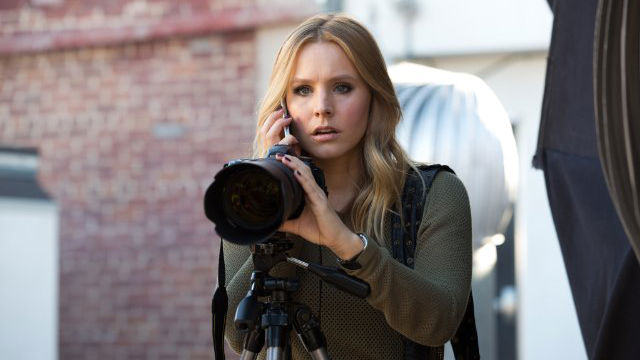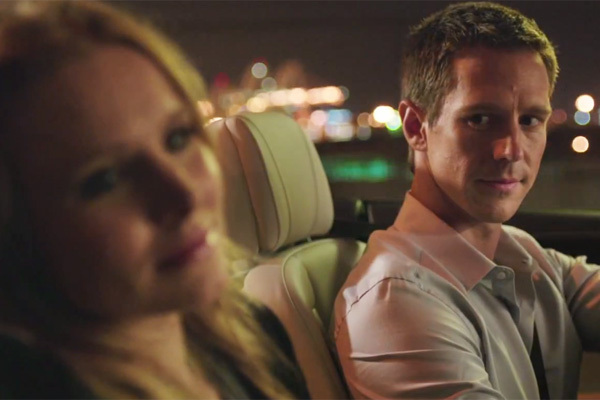Veronica Mars never went toe-to-toe with Buffy Summers. If anything, the success of Buffy the Vampire Slayer (1997-2003) paved the way for shows like Alias (2001-2006) and Veronica Mars (2004-2007), each featuring young, female protagonists in jobs more frequently filled by men. So Veronica wasn't the first of her kind, but I always thought she was the best.
Turns out I wasn't the only one.
Writer and director Rob Thomas perfectly articulated Veronica's distinctiveness to the audience at the film's SXSW premiere. Buffy and Sydney (Bristow of Alias) could literally beat up the bad guys, but Veronica's "superpower," he thought, should be that she learned not to define herself by what a guy thought of her outfit. (Thomas put it a bit more bluntly, saying it was that she just "didn't give a s—.")
Thomas taught high school for several years and served as a yearbook adviser, crediting that experience as a crash course in how teenaged girls act and talk. He also noted that high school is a time when everyone is painfully self-conscious.
 Robert Voets / Warner Bros. Entertainment
Robert Voets / Warner Bros. EntertainmentI have always thought it was Thomas's and Bell's willingness to have Veronica channel that self-consciousness into self-examination that raised the show above the level of melodrama. Because Veronica started as a member of the popular clique, her critique of teen culture included a strain of self-examination, even self-indictment. The show was not just about navigating the rigged systems of class and status. It was about trying to forge an alternative to those things, about creating an identity that wasn't based on them and would preserve the shards of self-respect and self-esteem that class privilege and social hierarchies grind so efficiently into dust.
As a male viewer, I also appreciated that the show presented men not just as the perpetuators of social hierarchies, but as equally pressured and warped by them. Otherwise, Veronica's relationship with Logan would simply be one more bad-boy infatuation, rather than two deeply wounded souls trying to learn how to trust life again by learning to trust each other.
In the film, Logan describes their relationship as "epic" and it is a mark of Thomas's writing and Jason Dohring's talent that he could do so without inviting giggles. Their relationship, which is the engine driving the film's plot, is akin to that of Gatsby and Daisy Buchanan, only this time with money on the side of the man. When Logan becomes the suspect of a murder investigation, Veronica can't help but try to clear him, threatening her current romance and risking the loss of a job offer from a New York law firm.
The murder investigation is not particularly interesting (or easy to follow), which makes me wonder if those unfamiliar with the show will find enough to engage them in between nostalgic cameos and inside jokes. If any readers are in that category, I strongly suggest watching at least the first season of the program (it is available on Amazon Prime) before watching the movie. It's definitely a sequel/continuation, rather than a stand-alone film.
And that shouldn't be a surprise. Given its reliance on Kickstarter contributions, Thomas said, "I wanted to give the people [who contributed] what they wanted."
In that, he absolutely delivered.
The plot is about clearing Logan. But the movie itself is about Veronica coming to terms with her identity. Bell said that in revisiting the role she was slightly worried that she wouldn't be able to "find [Veronica] as close to me" as she had when she was doing the television show. Thomas had always written dialogue that felt like it already existed in her head.
Happily for her—and us—it worked. The voiceover narration features Veronica's wry, distinctive musings, contemplating why, after so many years of trying to escape Neptune, she finds it impossible to turn her back on a place and a way of life that has been the source of so much pain.
The film is best in its character development. When you've spent sixty-four episodes with a character in a TV show, you get to know her well, so even smaller exchanges are infused with layers of meaning. We don't need the film to explain to us why Mac taking a job at Kane software is a big deal—we can just watch for Veronica's reaction.
 Robert Voets / Warner Bros. Entertainment
Robert Voets / Warner Bros. EntertainmentIt helps, too, that Veronica is a complex as well as a beloved character. She's smart and sassy, but there is an understandable element of anger in her, even rage. (In Buffy's pilot episode, the slayer turns to fight off her attacker; in Veronica's she admits that she was drugged and sexually assaulted at a party.) Like many victims of circumstance who have developed special skills to cope with dysfunctional environments, she wonders if she can ever go back to being normal . . . or whether there even is such a thing. As the daughter of an addict (mom is mentioned but does not appear in the film), she wrestles with questions of heredity and inheritance.
One of the best things about the television show was the father-daughter relationship between Veronica and former sheriff turned private investigator, Keith Mars (Enrico Colantoni). Dad often had to remind Veronica that she wasn't an adult yet and even save her once or twice when she got in over her head.
In the film, Veronica is an adult, and now she has to remind him of that fact. That is hardly an unfamiliar trope, but rarely has it played out on big screen or small between a parent and child with such obvious loyalty and affection. Keith is not a major part of the film's plot, but I would argue that his presence is—and always has been—crucial in making us understand what really saved Veronica, not just from death but from self-loathing bitterness.
Young people long to be loved for who they are, not just for what they accomplish. Perhaps the greatest sign of the film's intelligence is that while Thomas strives to give fans "what they want," Keith's steadfast desire that Veronica have what is best for her carries an ever-so-slightly stinging reminder of our selfishness. Escape Neptune and have a successful legal career? No way! We want Veronica sitting at that desk forever. We want her to give us hope that bullies and power brokers may sometimes beat but never break us. Yet there is a great cost of carrying the hopes of others, of not being able to lay your burden down after a period of service. A part of us, a part of me, wanted Veronica to be able to move on, even as the fanboy in me kept secretly hoping for a hook to Veronica Mars 2 or a series reboot.
Those conflicting desires, the mix of joy and melancholy, gave the film what every ten year high school reunion should have: a bittersweet quality. Veronica's high school career is an increasingly distant memory, but Veronica the human being, the hero, is still a work in progress.
Aren't we all?
Caveat Spectator
The film is a bit rougher and more explicit, particularly in language, than the television show. The characters (including Veronica) drink alcohol, and there are some mild sexual scenes as well as a moderate amount of sexual talk. For example, several characters mention the sex video that was made against her consent when Veronica was drugged as a high school student. In an early scene, a fellow job applicant draws a suggestive picture and shows it to Veronica to try to fluster her. She makes a lewd gesture at him. Another character shows parts of that video at a public gathering to try to embarrass Veronica. There is some brief gun violence and a scene with a character being stunned with a Taser. Several of Veronica's male friends get into a brawl. Veronica punches an old rival in the face. The film doesn't push the PG-13 envelope in terms of how explicitly the content is depicted, but it is pretty clearly aimed at young adults, not young teens.
Kenneth R. Morefield is an Associate Professor of English at Campbell University. He is the editor of Faith and Spirituality in Masters of World Cinema, Volumes I & II, and the founder of 1More Film Blog.











